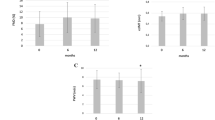Abstract
Vasodilator function is reported to be reduced in rheumatoid arthritis (RA), and is considered an early sign of vascular dysfunction, which is normalised by TNF inhibitors (TNFi). To optimise cost-effectiveness, tapering or interruption of TNFi therapy in established RA patients is advocated. We explored whether cessation of TNFi results in impaired vasodilator function and whether this relates to the development of a Disease Activity Score (DAS28)-based flare. Forty-one patients were assessed for eligibility as RA with at least 12 months of low disease activity (based on 28 joint counts); 35 enrolled into the randomised study: 8 were randomised to continue, 27 to stopping TNFi. Forearm vasodilation to acetylcholine (ACh) and sodium nitroprusside (SNP) was assessed before cessation of TNFi therapy (visit 1) and 6 months after (dis)continuation of TNFi or at flare (based on DAS28) whichever came first (visit 2). None of the patients who continued their TNFi therapy flared. Eight out of 22 patients who stopped TNFi therapy flared. The vasodilator response to ACh and SNP was reduced significantly in patients who experienced a flare of RA: In patients who did not experience a flare, the vasodilator response to ACh or SNP was not significantly affected. Vasodilator function is reduced after cessation of TNFi, but only when RA reactivates, indicating that early vasodilator dysfunction is a consequence rather than a cause of systemic inflammation in RA and not specifically related to inhibition of TNFα signalling. Without close monitoring, microvascular damage can occur after TNFi interruption with potential devastating implications for cardiovascular health. Trial registration: NCT02130076


Similar content being viewed by others
References
Avina-Zubieta JA, Choi HK, Sadatsafavi M et al (2008) Risk of cardiovascular mortality in patients with rheumatoid arthritis: a meta-analysis of observational studies. Arthritis Rheum 59:1690–1697
Zhang J, Fu L, Shi J, Chen X, Li Y, Ma B, Zhang Y (2013) The risk of metabolic syndrome in patients with rheumatoid arthritis: a meta-analysis of observational studies. PLoS One 8(10):e78151. https://doi.org/10.1371/journal.pone.0078151
Han C, Robinson DW Jr, Hackett MV et al (2006) Cardiovascular disease and risk factors in patients with rheumatoid arthritis, psoriatic arthritis, and ankylosing spondylitis. The Journal Rheumatol 33:2167–2172
Roubille C, Richer V, Starnino T, McCourt C, McFarlane A, Fleming P, Siu S, Kraft J, Lynde C, Pope J, Gulliver W, Keeling S, Dutz J, Bessette L, Bissonnette R, Haraoui B (2015) The effects of tumour necrosis factor inhibitors, methotrexate, non-steroidal anti-inflammatory drugs and corticosteroids on cardiovascular events in rheumatoid arthritis, psoriasis and psoriatic arthritis: a systematic review and meta-analysis. Ann Rheum Dis 74(3):480–489. https://doi.org/10.1136/annrheumdis-2014-206624
Shen J, Shang Q, Tam LS (2016) Targeting inflammation in the prevention of cardiovascular disease in patients with inflammatory arthritis. J Lab Clin Medicine 167:138–151
Bergholm R, Leirisalo-Repo M, Vehkavaara S et al (2002) Impaired responsiveness to NO in newly diagnosed patients with rheumatoid arthritis. Arterioscler Thromb Vasc Biol 22(10):1637–1641. https://doi.org/10.1161/01.ATV.0000033516.73864.4E
Van Eijk IC, Serne EH, Dijkmans BAC et al (2011) Microvascular function is preserved in newly diagnosed rheumatoid arthritis and low systemic inflammatory activity. Clin Rheumatol 30(8):1113–1118. https://doi.org/10.1007/s10067-011-1750-1.
Booth AD, Jayne DR, Kharbanda RK (2004) Infliximab improves endothelial dysfunction in systemic vasculitis: a model of vascular inflammation. Circulation 109(14):1718–1723. https://doi.org/10.1161/01.CIR.0000124720.18538.DD
Cardillo C, Schinzari F, Mores N et al (2006) Intravascular tumor necrosis factor alpha blockade reverses endothelial dysfunction in rheumatoid arthritis. Clin Pharmacol Ther 80(3):275–281. https://doi.org/10.1016/j.clpt.2006.05.011
Hurlimann D, Forster A, Noll G et al (2002) Anti-tumor necrosis factor-alpha treatment improves endothelial function in patients with rheumatoid arthritis. Circulation 106(17):2184–2187. https://doi.org/10.1161/01.CIR.0000037521.71373.44
Maki-Petaja KM, Hall FC, Booth AD et al (2006) Rheumatoid arthritis is associated with increased aortic pulse-wave velocity, which is reduced by anti-tumor necrosis factor-alpha therapy. Circulation 114(11):1185–1192. https://doi.org/10.1161/CIRCULATIONAHA.105.601641
Vizzardi E, Cavazzana I, Sciatti E, Bonadei I, D'Aloia A, Tincani A, Franceschini F, Metra M (2014) Evaluation of ascending aorta wall in rheumatoid arthritis by tissue and strain Doppler imaging during anti-tumor necrosis factor-alpha therapy. Clin Cardiol 37(12):738–743. https://doi.org/10.1002/clc.22332
Ghiti Moghadam M, Vonkeman HE, Ten Klooster PM et al (2016) Stopping tumor necrosis factor-inhibitors in patients with established rheumatoid arthritis in remission or stable low disease activity: a pragmatic randomized multicenter open-label controlled trial. Arthritis Rheum 68(8):1810–1817. https://doi.org/10.1002/art.39626
Funding
Funding for this vascular substudy of the POEET trial by Abbvie is gratefully acknowledged. The POEET trial was funded by The Netherlands Organisation for Health Research and Development (ZonMw) and the Government of The Netherlands, Ministry of Health, Welfare, and Sport.
Author information
Authors and Affiliations
Corresponding author
Ethics declarations
This study was approved by the institution medical ethics committee (CMO Arnhem/Nijmegen; registration number: CMO 2012/153). All study procedures were performed according to GCP and the declaration of Helsinki.
Conflict of interest disclosure statement
TJ has received fees for advisory boards over the last 5 years from Abbvie, Ardea, Astra Zeneca, BMS, Celgene, Eli Lilly, Menarini, Novartis, Pfizer, Roche, Sanofi Genzyme; TJ has received fees for lectures from Abbvie, BMS, Menarini, Grunenthal. No further disclosures were reported.
Rights and permissions
About this article
Cite this article
Rongen, G.A., van Ingen, I., Kok, M. et al. Vasodilator function worsens after cessation of tumour necrosis factor inhibitor therapy in patients with rheumatoid arthritis only if a flare occurs. Clin Rheumatol 37, 909–916 (2018). https://doi.org/10.1007/s10067-017-3961-6
Received:
Revised:
Accepted:
Published:
Issue Date:
DOI: https://doi.org/10.1007/s10067-017-3961-6




